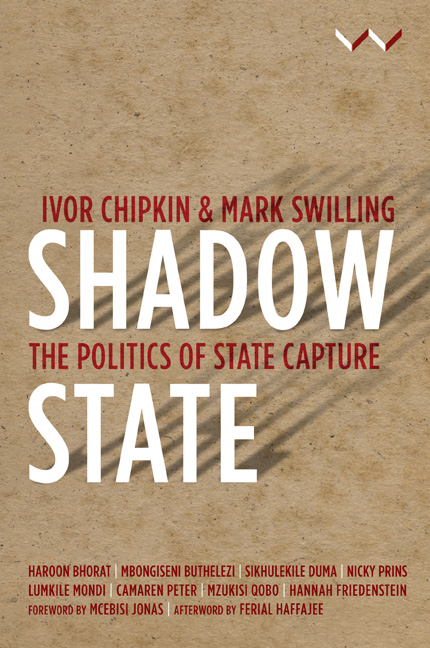Book contents
- Frontmatter
- Contents
- List of figures and tables
- Acronyms and abbreviations
- Key terms
- Acknowledgements
- Foreword
- Prologue
- Introduction
- Chapter 1 Structuring the Capture of the State
- Chapter 2 The Politics of Betrayal
- Chapter 3 Power, Authority and Audacity: How the Shadow State Was Built
- Chapter 4 Repurposing Governance
- Chapter 5 Conclusion
- Afterword
- Contributors
- Index
Afterword
Published online by Cambridge University Press: 17 May 2019
- Frontmatter
- Contents
- List of figures and tables
- Acronyms and abbreviations
- Key terms
- Acknowledgements
- Foreword
- Prologue
- Introduction
- Chapter 1 Structuring the Capture of the State
- Chapter 2 The Politics of Betrayal
- Chapter 3 Power, Authority and Audacity: How the Shadow State Was Built
- Chapter 4 Repurposing Governance
- Chapter 5 Conclusion
- Afterword
- Contributors
- Index
Summary
When the Betrayal of the Promise report first came out in May 2017, it was brilliant but bone-chilling. The report set out how South Africa was being run by a shadow state based on the repurposing of state institutions.
Presented in graphics, and with a wonderful mix of academic analysis plaited with the factual findings of investigative journalists, Betrayal of the Promise provided meaning in a time of madness. But it was bone-chilling because the process of capture seemed, at the time, to be ineluctable and irreversible, its power captured in each riveting one of the 63 pages. The tentacles of capture were too deep, the godfathers of South Africa too powerful, the then president too engaged in corruption to turn it around. Betrayal of the Promise provided a big-picture view of how institutions had been repurposed to suit the crony networks that had come to control and dominate the hundreds of billions of rands available in the procurement budgets of the state and its state-owned companies.
As an editor and a journalist, and then a researcher at the PARI, it felt as if all that I wrote with my fellow journalists to oppose state capture and corruption amounted to putting a finger in the dyke.
There is an image of the Gupta brothers, taken years ago, which flashes up on the screen to accompany almost every story about them because it was taken at one of the first and only interviews they granted the media. It features Atul and Ajay Gupta with Duduzane Zuma, former President Jacob Zuma's son and the Gupta family's business partner, along with one of their local partners at the time, Jagdish Parekh.
The family had made their first audacious act of capture: one of their earlier companies, Imperial Crown Trading, was competing with Kumba Iron Ore for Arcelor-Mittal's stake in a Sishen mine, and had hijacked mineral rights from Kumba in an act that was comedic but successful. Acolytes of the family had photocopied Kumba's application for rights to mine Sishen, submitted these as their own and won the rights.
- Type
- Chapter
- Information
- Shadow StateThe Politics of State Capture, pp. 139 - 144Publisher: Wits University PressPrint publication year: 2018



